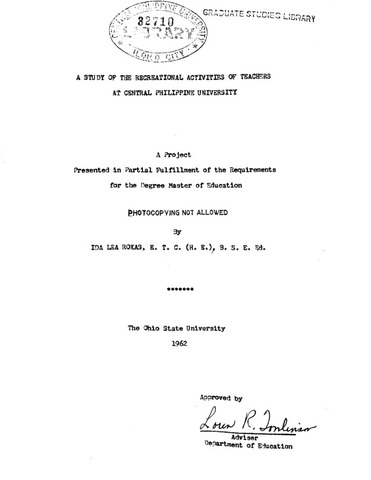A study of the recreational activities of teachers at Central Philippine University
| dc.contributor.adviser | Tomlinson, Loren R. | |
| dc.contributor.author | Jamora, Ida Lea Roxas | |
| dc.date.accessioned | 2022-03-14T03:18:46Z | |
| dc.date.available | 2022-03-14T03:18:46Z | |
| dc.date.issued | 1962 | |
| dc.identifier.citation | Roxas, I. L. (1962). A study of the recreational activities of teachers at Central Philippine University (Unpublished Master’s thesis). Ohio State University. | en_US |
| dc.identifier.uri | https://hdl.handle.net/20.500.12852/1972 | |
| dc.description | Introduction | en_US |
| dc.description.abstract | Educational agencies of various types have made studies of the different phases of a teacher's life but few of these agencies have exerted effort in studying the teacher's leisure time activities. The nature of teaching and its varied activities create a need for recreation and social activities. As Hounchell expressed it. “Relaxation and personal enjoyment constitute a normal outlet from hours of school duty of a routine kind." Children from all walks of life attend elementary school. It is difficult to determine what vital interests and skills that each child takes from school into life outside of the classroom. It is believed that teachers exert a tremendous influence in the acquisition of interests and attitudes toward living. There appears to be a need, therefore, to study the leisure activities of teachers. Statement of the problem. It is the purpose of this study (1) to determine what teachers, working at Central Philippine University in Iloilo City, Philippines, report they do in their free time; (2) to show the relation between choices of leisure activities engaged in by teachers and such factors as age, sex, marital status; and (3) to show what these teachers report as their reasons for participating in or not participating in a list of 68 activities presented to them in a questionnaire. Importance of the study. Teachers are looked up to as public examples and models for young people in the community. What they do or say becomes the center of attention. Their manner of living in all respects, their habits in all matters, their appearance and their choice of amusements and other types of behavior become frequent topics of community discussion. Even speech, posture, social engagements and dates come in for attention. This is especially true of teachers in the Philippines. Teachers are grown people and accepted leaders in the community. They have the right to choose their own recreations. However, they must bear in mind the risks that go with their choices of activities. Any item which may be looked at with question by any considerable number of adults or which would cause young people to be disappointed in their teacher shall call for careful choice. Hounchell in his article "Social Activities for Teachers" suggested the following points: 1. Acceptable social activity is a mark of personality and individual adjustment to any current situation. 2. Discreteness is a positive virtue in all the choices a teacher will make because of the necessary dignity and position of leadership that belongs to teachers. 3. There is a tendency toward liberality in recreation and social standards in most locations, but it is well that teachers practice self-criticism and forbearance in activities while establishing themselves. Central Philippine University is one of those educational institutions which strives for high standards in both the scholastic achievement and moral reputation of its students and teachers. Smoking, gambling, drinking of intoxicating drinks and dancing in public places or engaging in certain recreational activities which the University considers as questionable are frowned upon. Teacher contracts state that no faculty or member of its staff should indulge in smoking, gambling of any kind, use of intoxicating drinks as beverage or be seen in public places where the teacher's or the school's reputation is at stake. It is possible that not all of the teachers at Central Philippine University observe these regulations. It is upon this possibility, therefore, that this study has been based. This study does not attempt to judge the teacher’s behavior but to present an analysis of data secured from a questionnaire prepared purposely for the study and to find implications therein for future improvements in educational policies and practices. | en_US |
| dc.format.extent | 52 leaves | en_US |
| dc.language.iso | en | en_US |
| dc.subject.ddc | GSL Theses 301.072 Ar28 | en_US |
| dc.subject.lcsh | Recreation | en_US |
| dc.subject.lcsh | Teachers | en_US |
| dc.subject.lcsh | Central Philippine University--Faculty | en_US |
| dc.subject.lcsh | Teachers--Professional ethics | en_US |
| dc.subject.lcsh | College teachers--Professional ethics | en_US |
| dc.title | A study of the recreational activities of teachers at Central Philippine University | en_US |
| dc.type | Thesis | en_US |
| dcterms.accessRights | Publicly accessible | en_US |
| dc.description.bibliographicalreferences | Includes bibliographical references | en_US |
| dc.contributor.department | Graduate School | en_US |
| dc.description.degree | Master of Education | en_US |
Fichier(s) constituant ce document
Ce document figure dans la(les) collection(s) suivante(s)
-
Theses [18]


